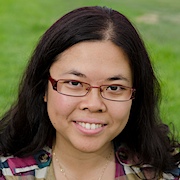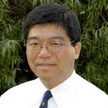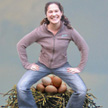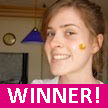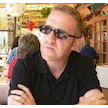
Matthew Todd
Favourite Thing: To do and understand new stuff
My CV
School:
Stamford Park Junior School, Altrincham, UK (erm 1979-1984) then Manchester Grammar School, UK (1984-1991)
University:
Cambridge University, UK, 1992-1995 (undergrad, Natural Sciences), 1995-1999 (PhD, Organic Chemistry)
Work History:
I did research after my PhD at the University of California in Berkeley (1999-2000) then for one year at Cambridge University, then worked at Queen Mary, University of London till 2005 when I came to Sydney Uni
Employer:
The University of Sydney in the School of Chemistry
Current Job:
With my students I carry out research in science, and when I’m not doing that I’m teaching people about science. So: science.
Me and my work
We make molecules to fight diseases, but we’re trying to get everyone to work together online to make them better and faster
I make molecules that are important in Nature – not water, and salt and things like that, but organic molecules. Things that are alive like you, me, that dog over there and the tree in my back yard – they’re made up of organic molecules – things like DNA, the deep red colour of a ripe tomato or the sharp taste of an apple. There are a lot of different kinds of molecules. Oooh and I mean a LOT. Now what we DON’T do is sit around making things that are known. That’d be silly. The tomato is pretty good at making that beautiful red colour without our help. What we do is work out ways of making NEW molecules that have never before existed on the earth. And we also spend our time thinking about ways of making molecules that are really hard to make but that might be useful.
So here’s a story – there’s a molecule that’s a good drug for treating a nasty disease in Africa called Bilharzia. The disease is caused by a parasite that lives inside you. It lives inside your bodily bits, laying eggs and generally being extremely gross. Literally millions of people have this disease, many of them kids who are very, very sick. The drug works fine. If you ever go off on holiday in Africa and you swim in a lake, you might well get this disease and have to take the drug I’m working on. So everything’s alright? Well not really. Apart from the fact that a lot of people still aren’t getting the drug, for dull reasons of economics, the parasite will become resistant to the drug eventually – that’s just natural selection, right? And we have no backups once that happens – a resistant parasite would just eventually kill you and there’s nothing we could do about it. And the current drug tastes TERRIBLE. So for lots of reasons we’re working on a way to make the drug better that solves a bunch of these problems – the World Health Organisation asked us to do this.
Thing is, it’s difficult thing to do. It’s difficult to make this drug better, and to keep the cost low. We kind of said “Okay – that’s a tough one, we need help.” So we did something that doesn’t usually happen in science. We opened up the problem to anyone and said “Please help us”. We decided to let anyone work on this problem with us. You all know about this idea – it’s what Wikipedia is all about, right? Well, maybe surprisingly, nobody works like that in science. Some people liked the idea. Some people thought we were silly. Usually scientists work in secret, and in competition, and don’t share.
But it worked. A bunch of people helped us, and we got a pretty good solution to the problem really fast. So here’s the thing: if you want to solve a problem fast, get help. Particularly from strangers who might be smarter than you. We’re at the point now where we’re asking students to do chemistry to help improve our solution.
We’re so unbelievably excited about this idea – of doing “Open Science”. We’re just about to start a project that’s almost too exciting – we’re going to try to find a new drug for malaria using open source methods. Lots of people think this won’t work. We think it will. But it’ll only work if we get help. So – maybe you can help us?
My Typical Day
Youtube baby songs-internet-research-teaching-Shrek-research-bed
Get up at 6:30 to the sound of my little boy asking for milk. Your parents went through a lot when you were small – go and thank them now.
Breakfast and singing songs about animals with my family, then drive to Sydney Uni for 8:30. I buy a coffee and go somewhere to use my computer for a bit, either the library or my office. People will have sent me a bunch of emails which I look at and answer, starting with the interesting ones and working through to the boring ones. Email takes a while because often people will send me cool things (good) and I get distracted thinking about them (can be bad). Our open source projects involve quite a lot of people, and I need to keep up with what everyone is doing – someone may have sent in an idea, or done a new experiment, and I read all about those things online.
I have a group of maybe 15 students – these guys are actually in my lab doing experiments. Most of them are studying for PhDs, which takes three years. You do a PhD if you finish university and think – “I’m really interested in this thing, and I want to study it.” It’s my job is to help these guys with their research. If they finish their PhD, which is pretty hard, they get to call themselves “Dr So-and-so”. Well, “Dr X” where X is their name. Nobody’s called “So-and-so”, clearly. I don’t do experiments any more because I have to think up cool ideas, get money for all the chemicals and write about our projects in things called “publications” – there’s a list of my recent ones here if you want to see. (Some are free to read, some are not, which is bad and not my fault – but don’t even get me started on that.)
So anyway I will have meetings with students – about an hour each student each week – where we talk about results of the experiments they’re doing. Sometimes we meet in the lab which means I have to put on my white lab coat and look like a scientist. The students are handling things that are sometimes smelly, or poisonous, and they do chemistry in big cupboards which suck air away from you so that you don’t smell the chemicals, and they put gloves on to protect their hands – you’ve got to be pretty careful. Most of the molecules we make have never appeared on the earth before, so who knows what they’ll do to you – safety is very important. We look at what these guys have found in their research, and try to figure out what it means. It often happens that a result is weird, and we can sit there for a long time trying to work out what’s going on. Often you think – OK, if I do this thing to this chemical, it should change into this, and often it does, but sometimes it doesn’t, and you need to figure out why. If you can’t figure it out, you don’t really understand it, and science = understanding, so you have to design new experiments. It would all be so easy if we could just SEE molecules, but they’re JUST SO SMALL. So you have to think up ways of working out what’s going on because you can’t SEE the thing you’re working with. It’s like astronomy, but the opposite. Stars are far away, molecules are right in front of you, but sooo small. Designing experiments to answer questions is the hardest thing in science, and one of the most creative things a human being can do.
For a lot of the year I teach chemistry. I give lectures, which are an hour each. I stand in front of about 300 students who are aged between 18 and 21 and talk about chemistry for an hour – I do that maybe 5 times a week. The students take notes and ask me questions about things they don’t understand. Lectures are great when students ask questions. If you’re not asking your teachers questions they will be sad.
Lunch at 12 or 1 for a bit of food and maybe a look at the paper online, or to meet with someone and talk. Some people take like an hour for lunch. What is that all about?
Afternoon is the same – talking with my students, reading about what other people are doing, writing. I’m an academic and that means I often have to go to dull meetings and ON PURPOSE I’m not going to tell you about that. Let’s pretend I don’t do that. I also sometimes take a student lab class – students (not my PhD students) will be doing experiments as part of their degree at uni, and I have to look after the class of maybe 30 students for a few hours, making sure everything is OK, that everyone understands what they’re doing and nobody catches fire. The lab’s kind of dangerous if you’re not sure what you’re doing.
There’s a lot of science happening around the world. Too much to keep up with. The last 15 years for me have been finding out what I’m interested in. So now I look at certain things that are really interesting to me. This means I don’t want to stop doing what I’m doing, but come 5 o’clock I need to snap out of it and go and pick up Small Boy and drive home to kiss Wife and have dinner. Small Boy watches a bit of Shrek or Toy Story, which he loves, and then goes to bed about 8, then Wife and I drink coffee and work till about midnight – she’s in law school. We don’t watch TV – if you find something you love doing, you won’t really want to watch TV much either.
What I'd do with the money
Set up a student prize to help us make our drug better
So this drug we’re trying to make better – we have a pretty good way of doing it, but it needs to be better still. (The drug is called “praziquantel” if you want to read more about it – actually a lot of cats and dogs take this drug when you deworm them, which you might have had to do if you have a pet). There are some things that don’t work as well as they should, and that means the cost is high, and that’s no good for a drug for places like Africa. To make what we’re doing better, we’re asking students to help us out. That means that students actually do experiments in the lab on how to make this drug, and they upload what they’ve done to a website, and we collect all the results together to try to figure out the best way of making the molecule. The thing about this is that because we’re using the internet, anyone can help out, and I’d like to get students from Africa helping because these guys actually live with this disease. We’re trying to find schools and universities in Africa to help us with this, but I think it’d be great if we could offer a prize to the students who help the most. If someone really makes an important discovery, we could give them a prize. I’d like to use the IASAus money as a prize for the best student contributions, wherever they come from.
(To help us out, you need to be able to use a lab in school, and I don’t know whether you’d be able to help us directly – it depends on what your school has, and whether your science teacher’s happy. The science involved is pretty easy, and is described here if your teacher wants to check it out.)
My Interview
How would you describe yourself in 3 words?
Truth = beauty
Who is your favourite singer or band?
Aphex Twin. Which is paradoxically one person.
What is the most fun thing you've done?
New things that seem initially as though they won’t work, e.g. convincing my wife to marry me.
If you had 3 wishes for yourself what would they be? - be honest!
Be able to fly, be able to be spontaneously invisible, and the third one is kind of adult, sorry, I’m being honest, sorry.
What did you want to be after you left school?
Astronaut who discovers new dinosaurs.
Were you ever in trouble in at school?
Yes, but let’s focus on the positive.
What's the best thing you've done as a scientist?
Done science research faster by using the web to reach people I didn’t know existed.
Tell us a joke.
There are only 10 kinds of joke in this world – the ones that are about binary and the ones that aren’t.
Sports followed
Favourite team
My profile link:
https://hydrogenj11.imascientist.org.au/profile/matthewtodd/


